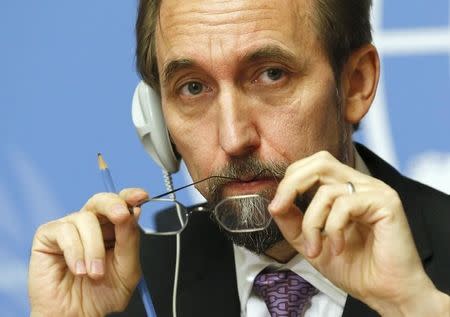U.N. rights boss decries Thai junta move as worse than martial law

GENEVA (Reuters) - The United Nations human rights chief said on Thursday that the Thai military government had replaced martial law "with something even more draconian" and called for a return to civilian rule. Thailand's ruling junta said on Wednesday it had lifted the martial law imposed just before a coup 10 months ago. But it invoked a security clause in the interim constitution that will mean the military will retain broad powers. U.N. High Commissioner for Human Rights Zeid Ra'ad al-Hussein said the decision "leaves the door wide open to serious violations of fundamental human rights" and "annihilates freedom of expression". The revision bestows "unlimited powers" on Prime Minister Prayuth Chan-ocha "without any judicial oversight at all", Zeid said in a statement, noting that the junta had pledged a return to civilian rule after the coup last May. The special security measure announced by the junta, known as Article 44, allows security forces to continue to make arrests without a court warrant and to detain people without charge. "It explicitly gives these military peace and order maintenance officers the authority to prohibit ‘the reporting of news’ or sale or distribution of books, publications, or any other medium that ‘may create public fear or are intended to distort news and information to cause misunderstandings which could affect national security or public order', Zeid said. Freedom of assembly also remains severely curtailed, with heavy punishment for protesters who gather in groups of more than five, he added. "In effect, this means the sweeping away of all checks and balances on the power of the Government, rendering the lifting of martial law meaningless." (Reporting by Stephanie Nebehay; Editing by Hugh Lawson and Kevin Liffey)

 Yahoo Sports
Yahoo Sports 